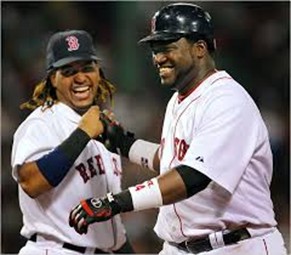Going to Red Sox games at Fenway Park was never just a game. The history and beauty of Fenway are more than a baseball stadium, it can feel like a religious experience, a ritual, a pilgrimage. Over the years, Red Sox fans have experienced hope, heartbreak, and resilience. Who can forget the infamous ground ball under Bill Buckner’s legs? Or the answered prayers of David Ortiz’s 12th inning walk-off Home Run in Game 6 of the ALCS against the Yankees, at 2 a.m., no less.
I have always felt a kinship between the Western Wall and the wall in Fenway’s left field known as the Green Monster. Both are more than architectural marvels. They are sacred spaces for reflection, connection, and moments where prayers feel heard.
I brought my daughters, Caroline and Lucy, to Fenway Park game after game, year after year. We returned to our same seats like pilgrims to the Kotel expecting awe and ready for wonder. The cheers echoed like prayers. Each inning was another sacred pause in the chaos of life.
Caroline was laser-focused. She counted every pitch. Tracked batting averages. Calculated slugging percentages in real-time. She followed the game like a Talmudic scholar parsing every word. Her highlight moment? When a foul ball soared our way and with perfect poise she caught it. It was more than a ball, it was a reward for her devotion, a miracle earned through preparation.
Lucy, meanwhile, had her own divine gift. She didn’t follow the game at all. Instead, she listened to the conversations of the people sitting around us. While Caroline recited every RBI and error, Lucy shared stories of the breakup in Row F, the proposal behind third base, the father-son reconciliation five rows up. She was the chronicler of humanity, a student of souls. I often told her: “Your perspicacity is only exceeded by your perspicuity.” Lucy saw clearly and listened deeply. She taught me how to hear the game between the pitches.
Lucy and Caroline were opposites, but I saw them as teammates. I reminded them often: “You are sisters, yes. But more than that, you are teammates: like Big Papi and Dustin Pedroia, and Big Papi and Manny.”
David Ortiz and Dustin Pedroia couldn’t have been more different. Papi, the towering Dominican slugger, all power and personality. Pedroia, the undersized grinder, all grit and mechanics. Yet their bond was legendary. Pedroia once said Ortiz was like a big brother, a protector, and a mentor. Ortiz famously called Pedroia “the little man that can hit everything.” He even admitted that for a while, he didn’t even know Pedroia’s name; he just respected his fire. Appearances didn’t matter to Big Papi. He saw the heart, not the height. As Ortiz said, “He plays like he’s 6’5″ even though he’s 5’7″ in cleats.” They trusted each other and they won together.
Then there was Manny and Papi, baseball’s odd couple. Manny Ramirez, the lovable eccentric who once disappeared into the Green Monster mid-game to pee. After this episode, a reporter asked Ortiz where Manny went. Papi shrugged and said:
“That’s Manny being Manny.”
Loyalty doesn’t demand judgment. Ortiz trusted Manny as a teammate and as a person. Peculiarities between innings meant little compared to performance between the lines.
Once, Manny even forgot to walk to first base after ball four. When GM Dan Duquette asked why, Manny responded:
“Sir, you pay me to count strikes, not balls.”
It was funny, but also profound. Strikes matter because you can strike out. Balls are extra. Know your role. Trust your team. Don’t overthink the walk, focus and wait for your pitch and be ready to hit.
These famous friendship fables echo Torah.
The bond of Papi and Pedroia? One can look to the relationship between King Saul’s son Prince Jonathan and the young shepherd boy, David. Jonathan, the prince of Israel, could have seen David as a rival. Instead, he saw him as a brother.
As scripture says:
“The soul of Jonathan was knit to the soul of David.” (1 Samuel 18:1)
When Papi described Pedroia as the “little guy” that can hit anything, it echoed what God told the prophet Samuel when choosing David as the next king. Samuel had focused on the strongest, tallest sons of Jesse, but God corrected him:
“Do not look at his appearance or at his height, for I have rejected him. The Lord does not see as man sees; for man looks at the outward appearance, but the Lord looks at the heart.” (1 Samuel 16:7) Then God said: “Arise, anoint him (David); for this is the one.” (1 Samuel 16:12)
Their loyalty transcended size and status. Just like Ortiz and Pedroia. Just like Caroline and Lucy.
Manny hiding in the Green Monster? I can see a parallel with Jonah hiding in the belly of the boat (Jonah 1:5) to escape G-d. God had called with urgency, but Jonah disappeared surreptitiously. Eventually, Jonah would reappear. and when he did, he delivered. Like Manny, Jonah answered his call on his own terms, in his own time.
When Manny focused only on strikes, not balls, it recalled the Israelites collecting manna in the wilderness. They were instructed to gather just what they needed and no more. It was about trust, discipline, and faith in the provision to come.
“This is what the Lord has commanded: ‘Gather of it, each one of you shall each take an omer, according to the number of the persons that each of you has in his tent.’” Exodus 16:16
“On the sixth day they gathered twice as much bread, two omers each. … This is what the Lord has commanded.” Exodus 16:22
This episode teaches deep lessons about discipline, sufficiency, trust, and honoring the rhythm of sacred time. Just like Manny Ramirez’s “you pay me to count strikes, not balls,” the manna story underscores knowing your portion—not hoarding, not overthinking, just trusting what’s given and respecting what’s sacred.
Caroline and I went to Fenway Park for the unforgettable emotional opening day on April 8, 2008. The Red Sox were celebrating their 2007 World Series title, their second championship in four years. From the right field dugout, emerged a surprise: Bill Buckner. The same Buckner who’s infamous 1986 error haunted fans for decades. The same Buckner who had avoided Boston for years, who was vilified by Red Sox Nation.
It was Bill Buckner’s first time back to Fenway Park. The crowd stood. Many wept. And in that powerful, redemptive moment, we all forgave Bill Buckner. Many of us also forgave ourselves. It felt like Yom Kippur. A communal absolution. A healing of generations.
I learned from both of my daughters every single game. Caroline taught me the holiness of focus. The beauty of structure. That if you respect the rules and keep your eye on the ball, sometimes miracles find you. Lucy taught me to listen to the unheard. To value people’s stories, spoken in whispers and laughter between pitches.
Together, they formed a perfect lineup: one a statistician of the diamond, the other a sage of the stands. I told them:
“You don’t need to be the same to be strong. You just need to cover each other’s ground.” Just like teammates.
At Fenway, I didn’t just witness baseball. I was taught teamwork. I learned loyalty. I saw sisterhood. And I learned to Father with Faith. And so, baseball became our Torah—nine innings at a time.
Enjoy a haiku inspired by this blog:
Loyal hearts align—
No judgment in victory,
Just one team, one cheer.
Appendix: The Story of Apples
A kindergarten teacher asked her class, “What color are apples?”
Hands shot up: “Red!” “Yellow!” “Green!” came the confident replies.
Then one quiet boy raised his hand and said, “White.”
The teacher frowned. “Apples aren’t white.”
The boy gently insisted, “Yes they are if you look on the inside.”
This story holds a powerful lesson.
It echoes how David Ortiz never judged Dustin Pedroia for his size or appearance. Instead, he recognized the heart, grit, and greatness within. Just as God instructed the prophet Samuel not to choose the strongest or tallest to be king, but to anoint David, the young shepherd, because of what was in his heart—not what was on the outside.
Lessons of loyalty begin with seeing people from the inside out. honoring who they are and not how they appear. That’s how true partnerships and true greatness are born.

“Big Papi” / David Ortiz and “the little guy” Dustin Pedroia
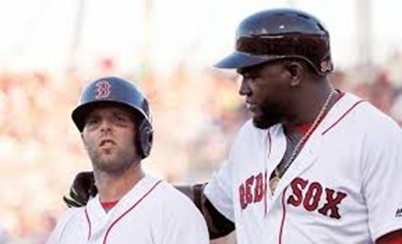
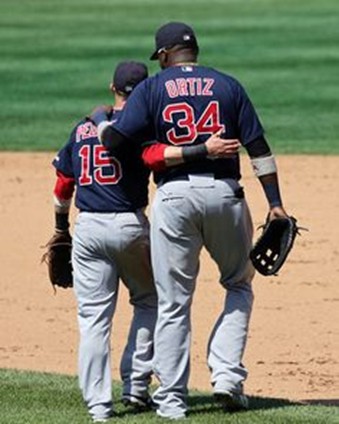
From Suffering to Celebration:
David Ortiz , the Boston Red Sox Superstar affectionately known as “Big Papi,” always celebrated his home runsby pointing to the sky. He did this to acknowledge the resting place of his mother in heaven and honor her memory as he crossed home plate. He wanted to celebrate his home run, while acknowledging the pain associated with the loss of his mom. In this way, his success was a tribute to her love, impact, and memory.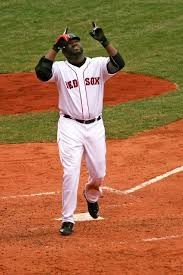
Haiku for Caroline and Lucy
Foul ball in the stands—
One caught, one caught every word.
Both played the same game.
Andy, Caroline, and Lucy at the Red Sox in 2007
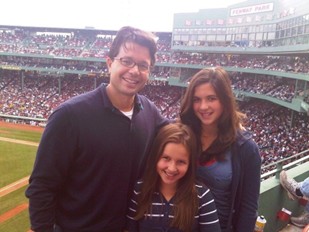
April 8, 2008 Andy and Caroline – Bill Buckner Game
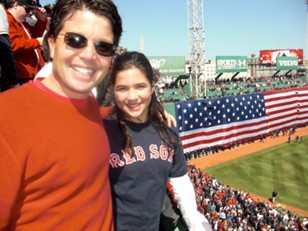
You can read a blog about the parallels between the Patriots and the Torah here.

